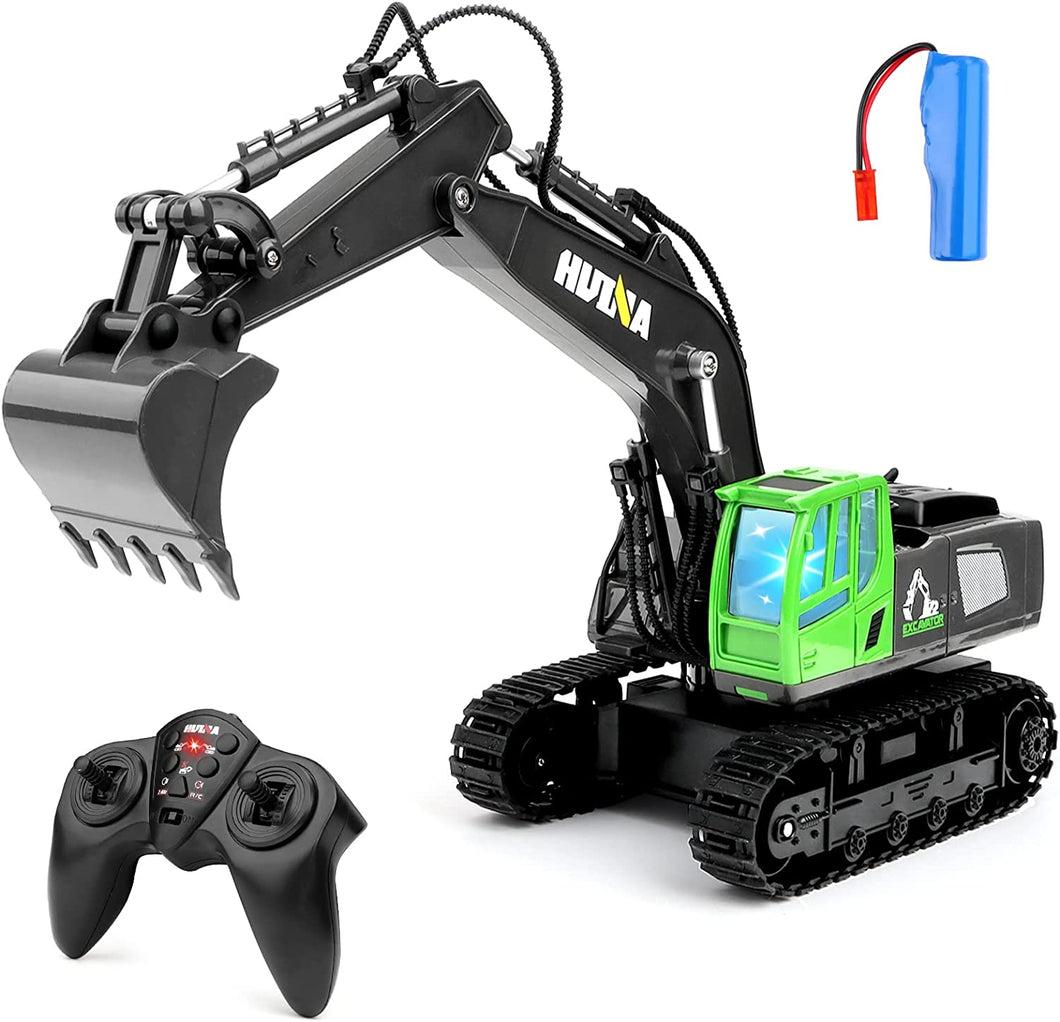Top Tips for Operating a rc excavator in Tight Spaces
Wiki Article
Understanding Just How Excavator Functions and Its Effect On Effectiveness
Excavators play an important role in construction and mining procedures, relying upon an intricate interaction of hydraulic and mechanical systems. Their capability to carry out a variety of tasks pivots on both their layout and the innovation integrated within. Understanding these components can greatly influence functional performance and performance. As innovations remain to improve the sector, one have to think about how these adjustments will certainly influence future practices and efficiency.The Essentials of Excavator Mechanics

The Duty of Hydraulic Systems in Excavators
At the heart of excavator operation lies the hydraulic system, which plays an essential duty in powering the machine's features and motions. This system uses pressurized hydraulic liquid to transfer energy, allowing different activities such as swinging, excavating, and lifting. By using the principles of hydraulics, excavators can carry out jobs with amazing precision and force, enhancing general operational efficiency.The hydraulic system includes crucial elements, consisting of valves, pumps, and cyndrical tubes, which work with each other to control the flow and instructions of the fluid. When the operator engages the controls, the hydraulic liquid is directed to certain cyndrical tubes, translating the operator's commands right into physical movement. This mechanism allows for responsive and smooth actions, which are crucial in building and excavation environments. double e volvo rc excavator. The effectiveness of the hydraulic system straight affects the performance and adaptability of the excavator, making it an essential component in contemporary excavation processesKey Elements of an Excavator
Recognizing the essential elements of an excavator is crucial for understanding just how this powerful maker runs. An excavator includes numerous considerable elements, including the undercarriage, residence, boom, arm, and container. The undercarriage offers stability and flexibility, typically including wheels or tracks to navigate different terrains. Your home consists of the engine and hydraulic systems, allowing the driver to regulate activity and power the device. The boom extends from your house, enabling upright reach, while the arm connects to the container, promoting digging and lifting operations.Additionally, the taxi houses the operator, equipped with controls for exact maneuvering. Each of these elements plays a vital role in the excavator's general performance, adding to its performance and performance on construction websites. Understanding these parts assists in enhancing and keeping excavator efficiency, guaranteeing tasks are finished safely and effectively.Attachment Convenience and Its Advantages
Attachment versatility is an essential element of excavators, making it possible for drivers to change in between different devices tailored for certain jobs. This adaptability not just improves work efficiency however likewise adds to cost-effectiveness by decreasing the demand for several machines. Recognizing the different types of attachments available can substantially affect the general efficiency and capability of an excavator on work sites.Kinds of Attachments
While excavators are mostly identified for their excavating capabilities, their true versatility hinges on the broad array of accessories available. These attachments improve the excavator's functionality, permitting it to carry out various tasks past excavation. Usual accessories include pails (for digging and scooping), hydraulic thumbs (for grasping products), and augers (for piercing holes) Grapples are made use of for relocating and handling particles, while rippers can break up tough surface areas. Various other specialized accessories, such as trenchers and plows, make it possible for excavators to adjust to specific task needs. This diversity not just increases the machine's energy across various markets, consisting of demolition, landscaping, and building and construction, however also permits operators to tailor their equipment to satisfy details task demands efficiently.Boosted Task Performance
Making best use of job effectiveness is a primary advantage of using numerous excavator accessories. Various accessories permit an excavator to perform several tasks without needing to switch over tools, saving useful time and labor. For example, using a hydraulic hammer can damage concrete while a pail attachment can dig deep into dirt, enabling a seamless operations. This convenience lowers downtime related to devices adjustments and enhances productivity on-site. Furthermore, specialized attachments enhance precision in tasks such as grading or landscaping, causing better end results. The capacity to adapt to numerous task needs not only enhances procedures but also reduces the demand for added machinery, guaranteeing that jobs are finished promptly and effectively. In general, accessory adaptability substantially adds to enhanced task effectiveness in excavation job.Cost-Effectiveness and Adaptability
Cost-effectiveness is a substantial benefit of making use of functional excavator attachments. These attachments allow a single excavator to perform multiple tasks, reducing the need for additional machinery and labor - double e volvo rc excavator. By switching between containers, hammers, and grapples, operators can tackle numerous jobs, from digging to demolition, thereby making the most of equipment application. This flexibility not only lowers operational costs yet additionally lessens downtime connected with changing tools. Furthermore, the ability to tailor excavators with specialized accessories enhances productivity, as they can successfully deal with varied tasks according to project needs. In conclusion, the mix of cost-effectiveness and adaptability in excavator attachments adds to enhanced functional effectiveness and source allowance in construction and excavation tasks
Advanced Innovation in Modern Excavators
Modern excavators are my blog increasingly equipped with advanced modern technology that changes excavation processes. Automation streamlines operations, while boosted fuel efficiency lowers functional costs. In addition, wise control systems improve precision and safety and security, noting a substantial development in excavation equipment.Automation in Excavation Processes
As excavation innovation develops, automation has become a critical element in boosting effectiveness and precision on work sites. Modern excavators are outfitted with sophisticated automated systems that facilitate jobs such as grading, excavating, and trenching with minimal driver intervention. These systems make use of sensors, GPS, and machine knowing formulas to guarantee exact positioning and deepness control, significantly reducing the margin for error. In addition, automation enables drivers to concentrate on strategic decision-making instead of manual controls, bring about improved efficiency in general. Such technologies not only simplify operations but additionally boost safety and security by decreasing human error in complicated operations. The assimilation of automation in excavation procedures represents a considerable improvement in building and construction modern technology, driving the market towards greater performance and performance.Improved Gas Effectiveness
Improvements in innovation have likewise resulted in considerable improvements in fuel performance for modern excavators. Modern machines are equipped with sophisticated engines that maximize power outcome while lowering gas consumption. These engines utilize ingenious combustion technologies, such as turbocharging and straight gas shot, to improve efficiency and effectiveness. Furthermore, lightweight materials in construction reduce overall weight, permitting for less power expense throughout operation. The introduction of variable speed controls enables operators to readjust engine efficiency according to certain jobs, additionally reducing gas use. Consequently, these enhancements not just reduced functional expenses however also add to environmental sustainability by reducing exhausts. Generally, boosted gas effectiveness in excavators is a necessary advancement that bolsters productivity and economic stability in the building and construction market.Smart Control Systems
While operators browse increasingly intricate task sites, clever control systems in excavators have emerged as necessary tools for boosting effectiveness and accuracy. These sophisticated modern technologies use sensors and algorithms to check different criteria such as tons weight, surface conditions, and functional efficiency. By immediately readjusting hydraulic functions, clever systems enhance equipment performance, causing improved efficiency and reduced endure parts. Furthermore, operators take advantage of instinctive interfaces that offer real-time feedback and diagnostics, enabling for educated decision-making. This integration of innovation not just improves procedures yet likewise reduces human mistake, adding to much safer workplace. As the construction sector continues to evolve, clever control systems will play a crucial function in shaping the future of excavator performance and effectiveness.Enhancing Functional Effectiveness With Excavators
Excavators play an essential duty in enhancing operational performance across different building and construction and excavation jobs. Their versatility permits numerous jobs, consisting of digging, lifting, and material handling, which improves process and minimizes the requirement for additional equipment. With powerful hydraulic systems, excavators can perform heavy-duty jobs with accuracy, substantially lowering the time needed to complete tasks. The combination of innovative technology, such as GPS and automated controls, even more maximizes their operation, making it possible for drivers to attain greater precision and lower material waste. Furthermore, contemporary excavators are made to take in less fuel and minimize discharges, contributing to both price financial savings and ecological sustainability. By using excavators properly, building teams can improve performance, meet task due dates, and improve total site management. This multifunctionality and efficiency make excavators indispensable tools in the modern-day building landscape.The Future of Excavators in Construction and Mining Industries
As the building and mining sectors advance, the future of excavators is positioned for significant makeover driven by technological development and changing operational demands. Developments in automation and expert system are reshaping excavator capacities, permitting boosted precision and effectiveness in operations. Autonomous excavators are emerging, minimizing the requirement for human treatment and reducing the threat of accidents.Moreover, the assimilation of telematics and IoT modern technology enables real-time monitoring of device performance and predictive upkeep, maximizing uptime. Environmentally friendly designs, consisting of hybrid and electrical models, are obtaining traction, aligning with sustainability objectives within the industry.Additionally, using advanced products and lighter layouts enhances gas effectiveness while keeping performance requirements. As these visit this site fads development, excavators will play an important function in meeting the enhancing demands for performance and safety in building and construction and mining, ultimately changing operational landscapes.Often Asked Inquiries
How Do Weather Condition Conditions Impact Excavator Performance?

Climate condition substantially influence excavator efficiency, as rainfall and mud can hinder traction and security, while extreme temperatures might influence hydraulic systems. Operators has to adapt to these variables to assure excellent performance and security during procedures.
What Safety And Security Actions Should Operators Comply With While Using Excavators?
Security steps for excavator drivers include putting on suitable personal safety devices, conducting pre-operation assessments, making certain appropriate communication with ground personnel, keeping a secure range from above hazards, and adhering to recognized functional procedures to protect against mishaps.Exactly How Commonly Should Excavators Be Kept for Optimal Performance?
Excavators need to be preserved consistently to ensure peak efficiency, generally every 250 operating hours or as specified by the maker. Routine checks boost reliability, prevent unexpected break downs, and expand the life-span of the devices.
What Is the Typical Life-span of an Excavator?
The typical life-span of an excavator usually ranges from 10,000 to 15,000 hours of operation. Aspects influencing long life include maintenance techniques, running problems, and the quality of the equipment itself, influencing Full Report total performance and performance.
Can Excavators Operate Uneven Surface Properly?
Excavators can run efficiently on irregular surface because of their articulated designs and adjustable tracks. These functions enable them to maintain stability and grip, enabling effective procedure in challenging environments frequently run into in construction and landscape design jobs. Each of these elements plays a crucial function in the excavator's general functionality, adding to its performance and performance on building and construction sites. Making the most of task effectiveness is a main benefit of using various excavator add-ons. While drivers browse significantly complicated work sites, smart control systems in excavators have emerged as necessary devices for enhancing efficiency and accuracy. Excavators play a crucial role in boosting operational efficiency throughout various building and excavation jobs. Developments in automation and synthetic intelligence are reshaping excavator capacities, allowing for improved accuracy and performance in procedures.Report this wiki page